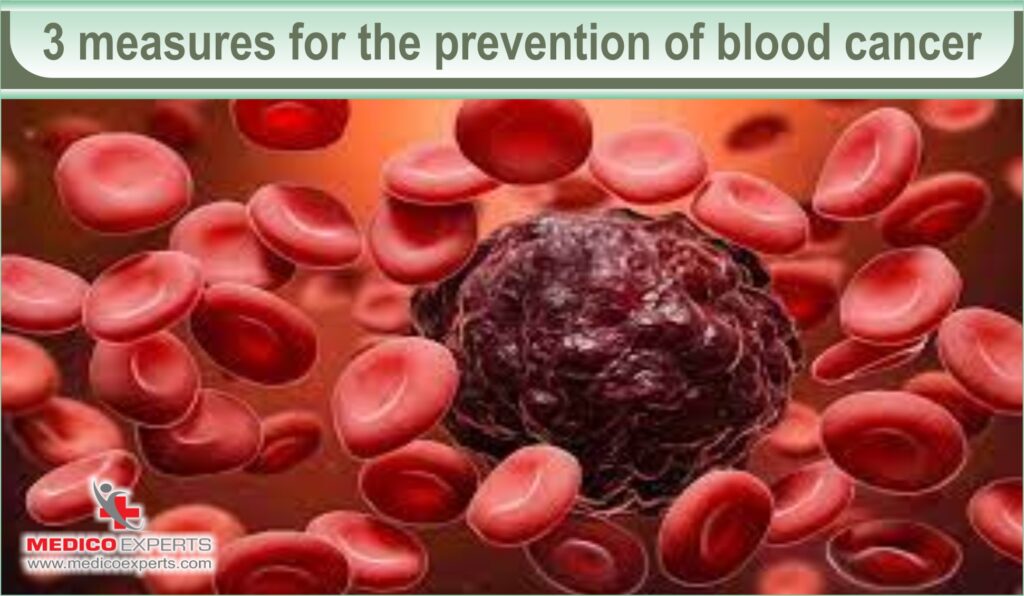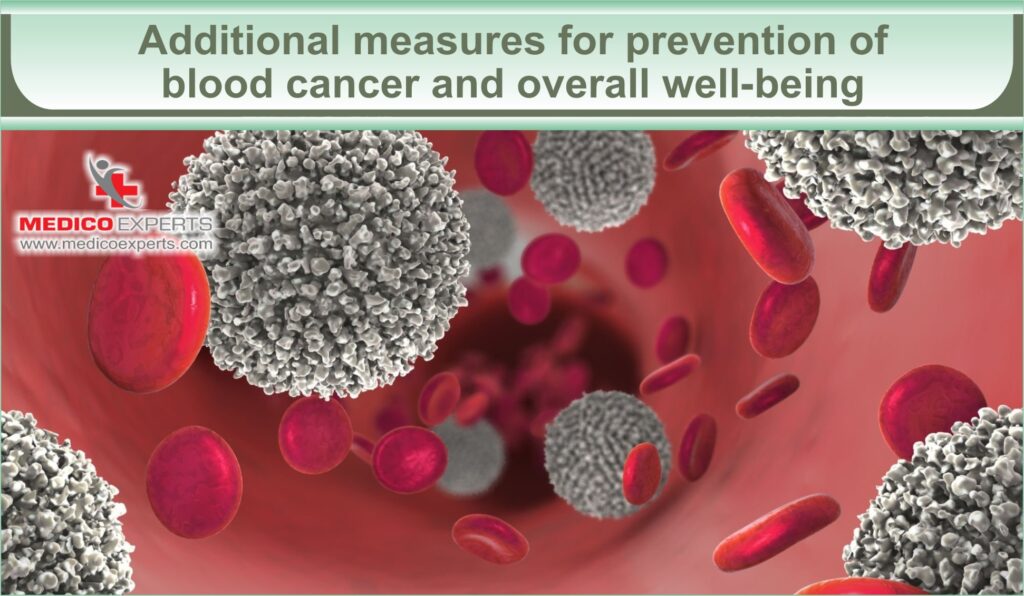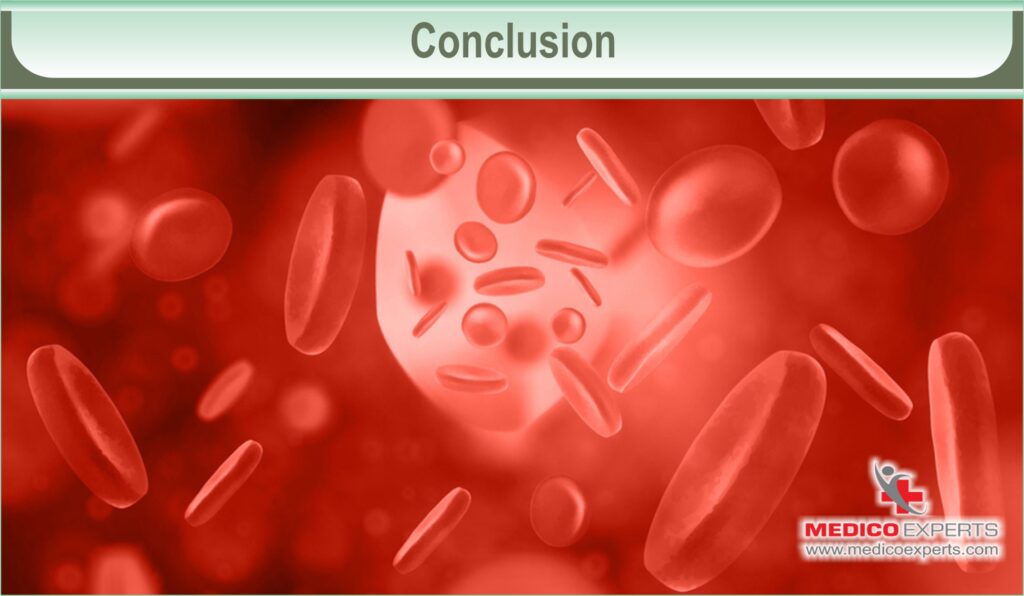There are some proactive measures for the prevention of blood cancer.
Key factors such as avoiding radiation, harmful chemicals, and tobacco exposure significantly contribute to reducing the risk of developing blood cancer.
Additionally, embracing a healthy lifestyle, including staying active and consuming a balanced diet, not only lowers the risk of leukemia but also helps prevent various other diseases.
By understanding these risk factors and making informed choices, you can take proactive measures to stay away from known risks of developing blood cancer.
Let’s learn about 3 known measures that can help you prevent blood cancer.
3 measures for the prevention of blood cancer

Despite extensive research, scientists have yet to discover definitive methods for preventing the majority of blood cancers.
But does that mean you should not do anything to prevent it?
Absolutely not!
While scientists have still not found the absolute risk factors, the focus lies on lowering. the known ones. Additionally, incorporating simple lifestyle changes can bolster immunity and potentially reduce the risk to some extent.
Here are the 3 known risk facts of blood cancer.
1. Avoid exposure to harmful chemicals
To minimize the risk of blood cancer, you should steer clear of specific hazardous chemicals like pesticides and industrial chemicals, as exposure to these substances can heighten the chances of developing the disease.
If your profession requires contact with such chemicals, it’s essential to implement appropriate safety precautions. Additionally, exposure to benzene has been linked to an increased risk of blood cancer.
2. Avoid exposure to radiation
It’s advisable to minimize exposure to high doses of radiation whenever feasible, as certain medical treatments entail the administration of intense radiation, which can elevate the risk of developing blood cancer.
While ionizing radiation can contribute to various types of leukemia, certain types are particularly susceptible, such as acute and chronic myeloid leukemia (AML and CML), as well as acute lymphoblastic leukemia (ALL). However, there is debate over whether chronic lymphocytic leukemia can be caused by exposure to radiation.
3. Avoid smoking and tobacco use
Smoking or using tobacco is a major risk factor not only for cancer but also for numerous other serious health conditions. Therefore, it is strongly recommended to abstain from cigarette or tobacco consumption entirely to safeguard against the development of these diseases and promote overall health and well-being.
Secondhand smoke comprises the fumes emitted from the burning end of a cigarette as well as the smoke exhaled by a smoker. Smoking is linked to the development of cancer in various parts of the body, including the blood (causing acute myeloid leukemia.
Additional measures for prevention of blood cancer and overall well-being

Here are some other measures that will help you avoid not only blood cancer but also stay fit and healthy.
1. Have these foods:
While there is no specific diet that can guarantee the prevention of blood cancer, incorporating certain foods into your diet may help reduce the risk. these foods include berries like strawberries, blueberries, and raspberries, vegetables like broccoli, cauliflower, and tomato, nuts, fatty fish, whole grains, legumes, green tea, and garlic.
2. Protect yourself from infections
Certain infections, such as HIV, and human T-cell lymphotropic virus (HTLV-1), can increase the risk of blood cancers. Take precautions to prevent exposure to these infections, such as practicing safe sex and getting vaccinated.
3. Understand your family history
Some blood cancers can be hereditary. If you have a family history of blood cancer or other related conditions, it’s important to discuss this with your healthcare provider. They may recommend genetic counseling or testing to assess your risk.
4. Get regular check-ups and screenings
Regular medical check-ups and screenings can help detect cancer at an early stage or identify precancerous conditions. Follow your healthcare provider’s recommendations for screenings, such as blood tests and imaging tests.
Conclusion

MedicoExperts provides access to experienced hematologists and oncologists who can offer consultations and guidance on blood cancer prevention strategies, early detection, and treatment options. They facilitate diagnostic tests and screenings to detect blood cancer or assess the risk factors associated with the disease.
MedicoExperts will provide personalized treatment recommendations, including chemotherapy, radiation therapy, targeted therapy, immunotherapy, or bone marrow transplantation.
Multidisciplinary Tumour Board has a team of experts, including hematologists, oncologists, radiologists, and pathologists, who collaborate to discuss and develop comprehensive treatment plans for patients with blood cancer.
FAQ :
Q1. What foods destroy cancer cells?
Food containing phytochemicals helps to fight against cancer
Q2. What is the biggest prevention of cancer?
The best ways to prevent cancer are to avoid smoking, and alcohol and do exercise and yoga every day.
Q3. What causes blood cancer?
Old age, family history, exposure to chemicals, and being male are some of the causes of blood cancer.
References
https://www.cancer.org/cancer/risk-prevention/chemicals/benzene.html
https://pubmed.ncbi.nlm.nih.gov/36220737/
https://www.cdc.gov/tobacco/campaign/tips/diseases/cancer.html
https://www.uchicagomedicine.org/cancer/types-treatments/blood-cancers/risk-prevention



